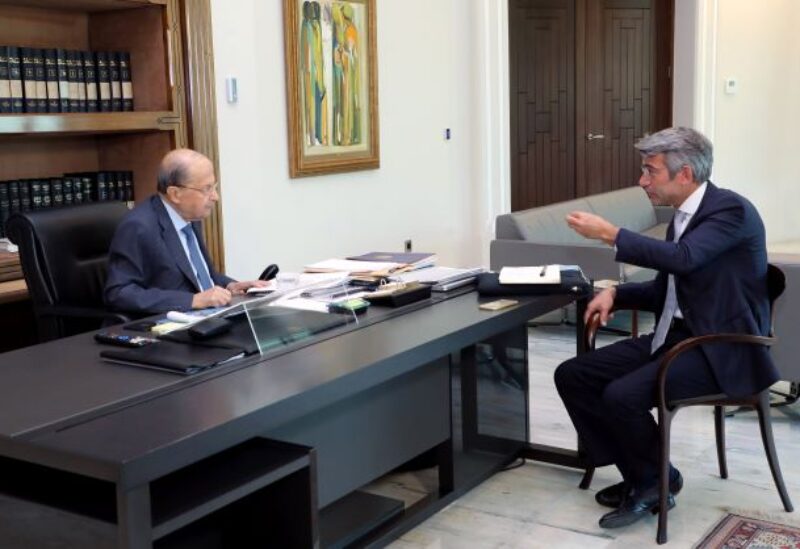
President of the Republic, General Michel Aoun, met this afternoon at Baabda Palace with Minister of Energy and Water Walid Fayyad, the discussion focused on energy situation in Lebanon and the efforts undertaken by the government and the ministry to improve productivity. Minister Fayyad informed the President of the Republic on the outcomes of his visit to Egypt and Jordan and the results of the talks with Jordanian officials to import energy from Egypt and Jordan through Syria.
After the meeting, Minister Fayyad confirmed that he conveyed to President Aoun the greetings of the officials he met in both countries. He said: “I learned from all the officials in Egypt and Jordan, in addition to the Syrian Minister of Energy, who was also present, the desire to overcome all obstacles, technical and non-technical, including the commercial necessities of contracting with various parties to extract gas from Egypt and electricity from Jordan through Syria. Everyone is seriously working on this issue in order to secure additional feed of Electricity for Lebanon so that people can enjoy some additional hours of feeding, but the matter is related to the expected financing from the World Bank.
Minister Fayyad added: “I met with an official from the World Bank for the Middle East, and he conveyed to me the determination to end the process by providing all the necessary facilities to Lebanon.”
In response to a question about who controls the fuel market in Lebanon, Minister Fayyad explained that work is “currently taking place, with the market being open and governed by the supply and demand mechanism, provided that the price is issued periodically and constitutes a maximum ceiling, as the price is supposed to be lower than the issued price which takes into account the exchange rate of the dollar and the international price of fuel. Everyone must abide by the pricing, including the station operators. We have requested and put in place the necessary measures to abide with. The most important is that cooperation and professionalism prevail, with commitment to the license obtained by the owners of the stations, to manage and to sell the existing quantities at the declared price until it runs out. Therefore, no one should control the market, provided that the citizen has the option to buy fuel or not.”
He pointed that “ we witnessed the great improvement in the markets, waste was prevented and the queues at the gas stations were reduced. We also dealt with the confusion that occurred in the past days and the restoration of the situation to normal .”
Regarding the different pricing of kilowatt for generators, the Minister of Energy explained, “The procedures followed in terms of pricing issued depend on scientific matters, according to the price of diesel during the month and the adoption of a general rate governing the tariff. During the past month, there was a discrepancy, as the same month witnessed some subsidies in its beginnings before lifting it. Therefore, the pricing was according to a rate that took into account this matter, which some generator owners were not satisfied with, and a large number of them inclined to achieve greater profits, but what matters to us is their commitment to the announced pricing and the need to install meters, especially with the high cost of kilowatt-hours Therefore, it is not possible to hold the citizen accountable according to the public consumption policy (ie cut off), as legally and morally, generator owners must install meters, even in light of the recently issued revised tariff. And we must all sacrifice a little to overcome the difficult stage we are passing through.”
On the time needed to be able to bring gas to Lebanon, Minister Fayyad said that he would have wanted this to take place within days, but work is underway to be within few months.
With regard to the Iranian offer to build two power plants, Minister Fayyad confirmed that no one had formally brought the issue to him, nor had it been brought before the Council of Ministers. “We really want to get help for Lebanon from the largest possible number of friendly countries, but the matter is entrusted to the Council of Ministers.